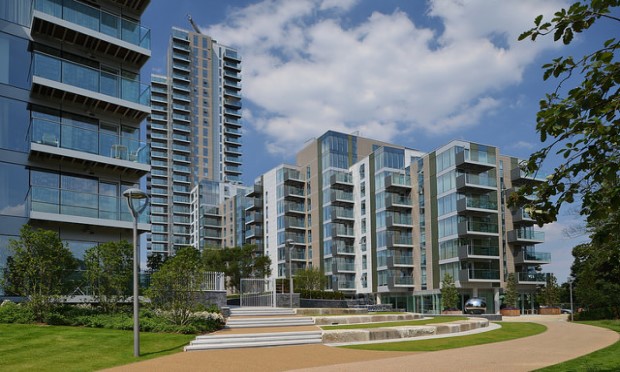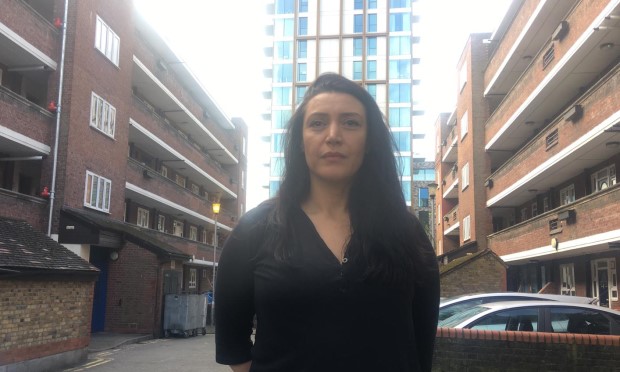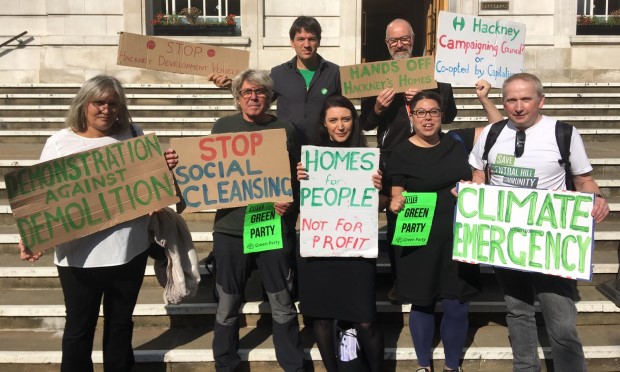Handful of leaseholders resist council plans for Woodberry Down redevelopment

A small group of residents on Woodberry Down estate are taking on the Town Hall, a multinational developer and their own neighbours as they resist a compulsory purchase order (CPO) which would allow a complex redevelopment to move to its next stage.
Liat Mordechai, Fabi Ahrain and Ugo Domizioli claim that the decade-long partnership between the Town Hall and Berkeley Homes is delivering a scheme that “does not contribute to the economic, social or environmental wellbeing” of the area.
Central to the group’s arguments are that a CPO can only go ahead if there is “a compelling case in the public interest”, as it emerged that so far 42 per cent of the homes for private sale in the scheme have gone to overseas buyers, with a predicted net loss by the Town Hall of just over 300 social rented homes.
However, council officers warned at the inquiry that without the CPO, the entire regeneration of the estate would by jeopardised, potentially leaving residents who had moved out and are waiting to move back into their homes on the redeveloped estate in limbo.
Christopher Jacobs, a lawyer acting for the group, said: “Compulsory purchase powers are being sought predominantly for the advancement of private interests.
“The objectors are able to demonstrate that a significant purpose of the regeneration is to attract foreign investment.
“A substantial majority of [private sale] properties in Phase 1 [of the redevelopment] have been sold to investors from Malaysia, China, Hong Kong and Singapore.
“The objectors will say that the regeneration scheme at Woodberry Down represents a thinly disguised attempt to gentrify an area of London and to disperse a long-established largely BME low-income community, which has traditionally depended on social housing, in favour of a more affluent middle-class alternative.”

The objectors, who were supported in their efforts on the opening day of the inquiry by Hackney Green Party, went on to warn the Town Hall “not to polarise the social mix in Hackney even further” through overseas sales.
According to land registry documents presented to the inquiry, one of the Phase 1 buildings, Hartwood Court, is wholly owned by Auric Harbour Ltd., an investment holding company incorporated in Singapore.
Green Party and housing activists turned out to support Mordechai on 20 August for the first day of the inquiry.
Her refusal to leave her home has meant the demolition of her block cannot proceed, leading the council to seek CPO powers to move ahead last year.
Mordechai, a resident for three decades, refused to sell her home following five years of frustrations and delays after having tried and failed to do a deal to exchange her property with Hackney Council under a ‘shared equity’ scheme.
Part of what Mordechai will try to prove before the Planning Inspector’s decision on the scheme on Thursday is that the council failed to take reasonable steps to acquire her property through negotiation.
Jacobs presented claims to the inquiry that the Town Hall and Notting Hill Genesis have been actively seeking to prevent leaseholders taking up shared equity properties in favour of shared ownerships which would yield rental income, though the council denies any such policy exists.
Dr Alex Armitage, a local Green Party activist, said: “Continuation of the Woodberry Down redevelopment is not consistent with the climate emergency that was declared this year.
“Hackney Council is pumping tonnes of CO2 into the atmosphere to kick council tenants out of their homes, break up communities and create
investment opportunities for wealthy businesspeople.
“Meanwhile, the objective of affordable homes for Londoners remains as far off as ever. Instead we should be investing in our existing council housing stock and renovating buildings that have gone into disrepair.”
Mordechai added: ““The investors are just exploiting the land and the lack of housing to charge more rent from low-income people who can’t afford to buy a home.”
It is not clear, however, that the objectors’ and activists’ arguments are shared by the community at large, with the scheme proceeding in full partnership with residents represented by the Woodberry Down Community Organisation (WDCO).

Geoff Bell, vice chair of the WDCO, said: “This is a demonstration that is not supported by any significant numbers within the area.
“They are going on the street, arguing against a regeneration that is benefitting the community at large, placing themselves against the interests and the wishes of the working class people of this area.
“WDCO submitted as evidence to the CPO a letter of support for the Phase 3 plans as they currently are, and are part of the council’s plans for the regeneration. We think it should go ahead as quickly as possible.
“If the Green Party or anyone else would come to us and talk to us about this, we would explain to them why.”
The Town Hall has pointed out that residents waiting to move back into their homes would be left in limbo were the scheme not to move forward through the CPO process.
Hackney agreed to give Berkeley the Woodberry land on a 999-year lease, with the developer demolishing the 1940s blocks and building redeveloped modern ones in their place.
The partnership also involves the Notting Hill Genesis housing association, the Manor House Development Trust, aiming to provide more than 5,500 new homes over eight phases of development by 2029.
The council argues that comprehensive redevelopment of the estate is “long-established and beyond credible challenge”, arguing that the scale of London’s housing needs brook no delay, with the scheme itself set to bring “significant benefits” to the community once complete.
Hackney Mayor Philip Glanville has also argued that the model of the scheme, by which the Town Hall partners with Berkeley, pre-dates the Town Hall’s current policy of delivering its own council homes in-house.
He said: “Construction began in a period when councils were essentially prevented from directly building homes and went on site for delivery in the teeth of the Great Recession around 2008.
“While the project is being delivered by a partnership of the council, Berkeley Homes, Notting Hill Genesis and local residents – rather than directly by the Council – it is delivering significant benefits for the community.
“As well as a new, modern home at a social rent for every existing secure council tenant, the project has already delivered a new community centre, secondary school, and parks, alongside the reopening of the stunning Woodberry Wetlands for the first time in nearly 200 years.”
Glanville added that the Town Hall had been “clear from the start” that 41 per cent of homes would be for social rent and shared ownership.
The objectors have argued that the council’s own planning growth manager has noted that the Town Hall’s core strategy “required all housing developments in the borough that propose 10 or more units to deliver 50 per cent affordable housing”.
James Pereira QC, acting for the Town Hall, argued that old-style estates such as Woodberry Down come with their own share of polarisation and social exclsuion issues with “a community comprising large numbers of isolated, mono-tenure homes”, with ageing buildings causing running costs and service charges to increase.
The council’s barrister also pointed to the numerous awards won to date by the scheme, as well as the fact that the Mordechai and the other objectors represent “a tiny minority”.
Pereira said: “Without wishing to diminish in any way the rights of those remaining objectors or the genuineness of their feelings towards the scheme, this is a remarkably small number.
“It is acknowledged that schemes of this kind can provoke genuine concern and objection. Requiring large numbers of people to move inevitably causes uncertainty, anxiety and upheaval, and the acquisition of homes bought under the right to buy often raises concerns over the affordability of replacements and the feasibility of staying within the locality.
“The development partners are fully committed to supporting the community within the estate, and consistently with this the council has an excellent package of support for both secure tenants and leaseholders.
“In general, the regeneration scheme has been well-received, and the steps taken to support the existing community have proven effective.”
